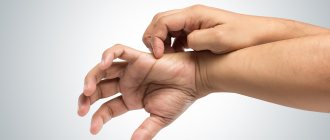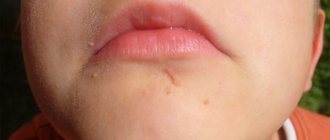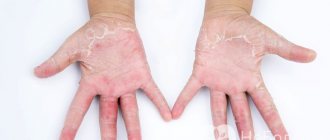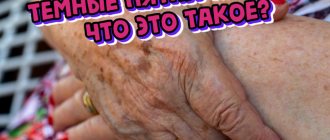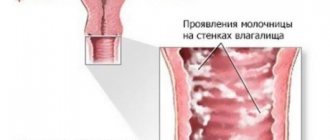What is a tingling sensation on the skin?
Tingling on the skin is at least rare, but every person experiences it.
- If this sensation appeared after a long stay in one position, for example, after a night's sleep, and then quickly passed, then this is a normal reaction of the body to the fact that the nerves were in cramped circumstances.
- If the tingling sensation on the skin does not have a logical explanation for its origin, and the symptom often recurs, then you need to contact a specialist to undergo an examination and understand the cause of what is happening.
From a medical point of view, we feel tingling when:
- nerve endings are not able to transmit signals to the brain (for example, due to oppression during sleep),
- in the area where there is a tingling sensation, blood circulation is impaired.
What you can do at home and at work.
To make the tingling bother you as little as possible, you can try exercises, massage, vitamins and proper nutrition. It must be said that none of these things have ever harmed anyone, so feel free to give up bad habits, start moving more and eating right.
The easiest way to start is with a diet - unlike sports and massage, this will not require additional funds or time from you. Most often, with constant tingling, it is necessary to cleanse the body of waste and toxins. You should remove from your diet any grains containing gluten, as well as bread and any flour products, do not drink alcohol, and avoid red meat. Eat more vegetables and fruits, pay special attention to fresh seasonal products - watermelons, apricots, grapes. Among vegetables, it is not only possible, but also useful to eat carrots, peppers, tomatoes, potatoes, spinach, and peas. Drink more water or herbal teas (1.5 to 2 liters per day) and less coffee and strong tea. Eat fatty fish, nuts and seeds - foods rich in vitamins, amino acids and microelements, which are so necessary for your body during the diet. Take vitamin tablets, especially vitamin B3 - it will relieve stress and improve blood circulation.
To make tingling completely disappear from your life, move more - while sitting in the office, get up every hour for 5-10 minutes, walk before and after work, find some kind of sport that suits you. It doesn’t matter at all what it will be – cycling, basketball, roller skates or tennis, the main thing is that you enjoy it and you don’t have any contraindications to these exercises. If you have a sedentary lifestyle, there are excellent sets of exercises. When performed regularly, you will forget about the problem of tingling, and your overall health will improve. Watch a video lesson about one short but effective complex that will suit everyone: If sports and you do not overlap at all, then think about maybe you love gardening or often do house cleaning - such a load is quite suitable.
You can do the massage yourself, for example, at the moment when your arm or leg suddenly tingles directly at the site of the discomfort, or you can contact a specialist who will select the optimal course for you. Unfortunately, the services of a specialist are quite expensive and not available to everyone - here modern technologies will come to your aid - buy yourself a massage chair or pillow and use it at any convenient time. It happens that the tingling sensation finds you right in the office and, naturally, there is no massage chair or massage therapist nearby. Look, perhaps your office center has massage chairs in the relaxation area, or you can purchase small massagers that are convenient for doing a back massage yourself.
Its classification
The phenomenon when a tingling sensation is felt on the skin, as if with needles, can be of the following types:
- all over the body
- in certain parts of the body.
According to the duration of the symptom, cases are distinguished:
- chronic manifestation of tingling sensations,
- the symptom is episodic in nature - a person experiences such signals on the skin sometimes, or they are associated with a temporary specific factor.
We will tell you below about identifying the symptoms and causes of itching and tingling of the scalp, face, arms, legs, genitals, back, tingling of the skin of the chest, abdomen.
Some diseases that cause these symptoms
-Cervical spondylosis. When the disease occurs, adjacent vertebrae grow together and therefore the nerves begin to be compressed. This is what causes such unpleasant tingling sensations in a certain area of the body, namely the back of the head, neck and upper back. — Intervertebral hernia. If it is present, nerve endings and even blood vessels are pinched. Therefore, a tingling sensation may occur in the legs or back. — Diseases of the heart and blood vessels give a feeling of numbness in the extremities, in particular the left hand. — Gout, various arthrosis and other joint diseases cause inflammatory processes, which leads to compression of the nerves and therefore tingling is felt in the arms and legs. - If cerebral circulation is disrupted or blood vessels are blocked there, then a stroke may occur and then the tingling sensation is localized on the scalp. At the same time, the vision may become dark and the muscles will become paralyzed. - Mental illnesses can also have symptoms of tingling throughout the body. Most often, such symptoms are characterized by schizophrenia, depression or neuroses. - But tingling in the legs can signal the development of diabetes. It is with this disease that the nerve tips are affected, which gives similar symptoms. If such symptoms appear periodically, there is no need to worry at all. But tingling for no particular reason, which appears quite often, should alert you.
But it happens that even during a medical examination no diseases were found, then perhaps the person is simply leading an incorrect lifestyle, and when he changes, all the unpleasant symptoms and sensations will simply go away and will no longer bother you. — Often, incorrect body position causes congestion in the vessels and limbs — Tight clothing and shoes can also lead to squeezing of blood vessels and a deterioration in the blood supply to the body. — Correct posture is the key to good health. — Hypothermia can also lead to tingling sensations in the body. -To improve your well-being and general condition of the body, you need to do physical exercises or yoga, and also visit the pool and gym.
Tingling in the head like needles is an unpleasant symptom, usually associated with overwork or neurological disorders. Sometimes it is a sign of more serious illnesses, so when it appears, it does not hurt to understand the problem and determine the cause of the discomfort.
Identifying a symptom
Every cell of the body receives nutrition through blood circulation. If some part of the body is pressed, for example, by body weight during sleep, then blood circulation in this area is difficult and numbness may be felt. The restoration of blood flow will be signaled by tingling sensations on the skin for some time.
In old age, due to a slowdown in processes, including blood circulation, constantly present symptoms of tingling and numbness on the skin (chronic manifestation) may be observed. A person may experience discomfort and malaise. To determine what sensations make up the picture of malaise and what they are most often associated with, the patient should be more attentive to various body signals.
Possible causes of tingling skin all over the body and in different places are described below.
Possible violations
If the appearance of tingling on the skin does not have a simple and understandable reason for the person suffering from this problem, then the symptom may be a manifestation of the disease:
- diabetes mellitus,
- functional disorders in the liver,
- diseases of the skeletal system: joints and spine;
- tumors of a malignant nature,
- cardiovascular disease,
- injuries of various types,
- migraine,
- carpal tunnel syndrome,
- acute circulatory disorders in the brain,
- an inflammatory disease that can initiate the effect of compression of nerves, as well as pathological formations;
- malfunction of the thyroid gland,
- epilepsy,
- Raynaud's disease,
- frostbite,
- barotrauma of the ear,
- cold allergy;
- anaphylactic shock;
- bullous dermatitis,
- severe alcohol dependence,
- herpes of various types (shingles, simple and genital herpes),
- mental illness.
Spinal infections
Spinal infections can occur after surgery or as a complication of other conditions, such as fractures, traumatic wounds, cancer, diabetes and HIV.
The infection can irritate or damage the nerves. Symptoms may include:
- back pain or stiffness
- numbness or tingling
- muscle weakness or cramps
- fever and chills
- redness in the affected area
Treatment
Treatment for a spinal infection depends on the cause, but may include antibiotics and antiviral or antifungal medications. For people with severe infections or spinal injuries, your doctor may recommend surgery.
Fighting the sign
Diagnostics
To understand what to do when there is tingling on the skin, it is necessary to find out the cause of this phenomenon. You should be wary if the symptom is always observed on one side of the body, and the presence of other accompanying symptoms is also a bad sign:
Specialists will conduct an examination to find the cause of the tingling sensation on the skin. If necessary, the following methods can be used:
Treatment
If the examination reveals a disorder that manifests itself through the symptom of tingling on the skin, then a treatment course is prescribed to stabilize the condition and prevent possible undesirable consequences, for example, a stroke.
When tingling sensations are caused by cases that are not underlying any disease, then simple rules should be followed so that this phenomenon occurs less often:
- increase beneficial loads on the body (consult a doctor) to improve blood circulation, these could be activities:
- swimming,
- yoga,
- visiting a massage parlor,
- as well as a gym;
- If a person is forced to lead a sedentary lifestyle, then it is necessary:
- do warm-ups often,
- watch your posture,
- eliminate the cross-legged pose;
- you should not stay in one position for a long time, do warm-ups;
- dress so that your limbs do not become overcooled;
- in clothing, avoid elements that can compress the body: belts, tight dresses or shirts; try to wear clothes made from natural fabrics.
Tingling skin is a rather unpleasant feeling that can occur with various diseases and conditions. The localization of the symptom and the features of the clinical picture help determine the cause.
Tingling all over the body, like needles
Netbolezni.Net » Neurology » Go back
A person can experience a wide variety of sensations. Tingling like needles all over the body: arms, legs, back and other parts of the body is one of the most unusual and unpleasant. This may be a signal of health problems, following which you need to contact a professional.
The mechanism of stabbing sensations in the limbs and causes
Each person experienced a feeling of piercing goosebumps throughout the body. There is a clinical term for this sensation - paresthesia. It is often accompanied by a number of additional symptoms:
- the skin becomes numb and cold temperatures appear in the hands and feet;
- muscle weakness;
- joint mobility decreases;
- itches and burns the skin;
- skin sensitivity decreases;
- there is a feeling of slight tickling or sharp pain.
Almost always, such symptoms are associated with poor circulation or decreased sensitivity of the nerves. Such, at first glance, not bright symptoms can be signs of serious illnesses.
Paresthesia can be chronic. In older people, blood circulation naturally slows down and the tingling condition is normal for them. In other people, it occurs when the functioning of nerve cells is disrupted. Paresthesia can also be caused by:
- monotonous and long-term physical activity;
- fungal infections;
- skin diseases;
- allergies;
- animal and insect bites;
- the presence of parasites;
- hypothermia or heat stroke;
- lack of vitamins (sodium, vitamin B12, potassium and calcium);
- poisoning (alcohol, food, mercury, arsenic, lead).
Latent diseases are characterized by such degrees of paresthesia as numbness, itching and prickling throughout the body. If the symptoms progress, the sting becomes more acute and turns into pain, and the numbness does not occur often and does not go away for a long time, you should immediately take therapeutic measures.
What diseases can cause tingling?
This unusual sensation can be caused by a number of medical conditions. The important thing is that stabbing sensations throughout the body can be both a primary sign and an additional symptom. Diseases that cause itching:
- Kidney diseases and renal failure
. Tingling occurs mainly in patients with uremia, most often at the terminal stage. The stronger the impairment of kidney function, the more intense the symptom manifests itself. Dialysis helps reduce tingling sensations, but it is not able to completely get rid of them. - Diseased liver and bile ducts
. Severe skin itching, as the main symptom, manifests itself in cirrhosis, cancer of the head of the pancreas, hepatitis, primary sclerosing cholangitis, Giardia infection, obstruction of a large bile duct and large duodenal papilla, and cholestasis. Tingling occurs due to disturbances in the functioning of the liver and related organs. The indications are localized either at the site of the projection of the liver itself, or throughout the body. - Disorders of the functioning of the thyroid gland
. Persistent generalized itching occurs in approximately 10% of patients with thyrotoxicosis. The appearance of stabbing itching in patients with endemic goiter, which is not treated for a long time, is also characteristic. According to experts, the appearance of a stabbing sensation is due to the fact that blood begins to flow to the tissues, resulting in an increase in temperature. Also, with hyperthyroidism, chronic urticaria can develop, the essence of which is the appearance of itching, it occurs due to dry skin. - Diseases of the blood and cardiovascular system (cardiovascular system)
. These include the following pathologies: lymphomas, lymphogranulomatosis, leukemia, mastocytosis, Waldenström macroglobulinemia, paraproteinemia, polycythemia vera, myelomas. - Carcinoid syndrome
. Tingling occurs due to intense hot flashes in the head and neck. This often occurs due to stress, excessive alcohol consumption and overeating. - Senile/senile itching
. Appears mainly after 70 years. The skin does not retain moisture well and dries out. Old people often dress too warmly, and the work of the sweat and sebaceous glands is disrupted. - For HIV
. Itching develops due to infections resulting from a decline in the immune system. It is strongly manifested in the cold season. - For diseases of the nervous system/nervous itching
. It is provoked by depression, stress, schizophrenia and others. At the same time, the level of serotonin and dopamine and internal opioids increases. Generalized itching may appear due to an illusory parasite that actually does not exist (parasitephobia). - Allergies
. It may appear due to the application of specific ointments, taking certain medications, cosmetics or detergents. Itching appears in the form of allergic urticaria or eczema. - Skin fungi
. Keratomycosis affects the skin of the arms, abdomen, buttocks, elbows, and mammary glands. - Vitamin deficiency
. With it, the skin dries out due to a lack of vitamins A, B and C and zinc and a tingling sensation occurs. - Neglect of hygiene rules
. - Menopause in women
. Tingling affects the groin area. - Neurodermatitis
. There is generalized itching, accompanied by burning and redness. - Psoriasis
. Tingling sensations appear as the disease progresses, and peeling also occurs. - Folliculitis
. - Insect bites
, including fleas. - Spondylosis of the cervical vertebrae
. The cervical vertebrae fuse together, causing the nerves to be compressed. Tingling is observed in the upper back and the back of the head and face. - Diabetes
. Patients experience itching and tingling in the genital area. Appears due to candidiasis of the mucous membranes. With diabetic neuropathy, tingling sensations are localized in the head, since the nerve endings in this part of the body are most affected. Sensations throughout the body are very rare and occur against the background of disturbances in the processes in the kidneys. - Intervertebral hernia
. Intervertebral nerves and blood vessels are pinched, stabbing in the legs and back. - Poor blood circulation in the brain
. Tingling in the scalp area occurs due to a stroke, blockage or rupture of blood vessels. Accompanied by muscle paralysis, darkening of the eyes and dizziness. - Joint diseases
. This means arthritis, gout, arthrosis. Due to the ongoing inflammatory process, the nerve roots are compressed. The sensation of goosebumps is localized in the legs.
Diagnosis of diseases
If the patient has been bothered by stabbing sensations for a long time, it is worth contacting a specialist at the clinic.
This is especially true if tingling is observed in one part of the body and its intensity increases with any muscle activity.
The doctor will be able to collect a general history, taking into account secondary symptoms (such as nausea, muscle spasms, dizziness, darkening of the eyes) and accurately determine the cause of the tingling sensation.
First of all, you should contact a therapist. He will prescribe a blood test to the patient, ask him about his general well-being, and based on this, refer him to a more specialized specialist. To diagnose diseases, the following series of procedures are prescribed:
- heart electrocardiogram;
- X-ray;
- MRI (CT) of the spine and brain;
- electromyogram;
- Vascular ultrasound;
- electroenteromyography;
- blood analysis.
If necessary, refer to:
- cerebrospinal fluid analysis;
- skin or nerve biopsy.
Based on the test results, the therapist refers the patient to a psychotherapist, surgeon, cardiologist or neurologist.
Treatment
Depending on the cause of the symptom, the doctor most often prescribes the following treatment options:
- Allergic reaction - tingling is accompanied by itching, burning and redness of the skin. Antihistamines are prescribed.
- Nervous disorders and mental stress - taking sedatives.
- Short-term stabbing sensations are eliminated by using cooling ointments.
- Tunnel syndrome - stabbing in the hands. Anti-inflammatory drugs and drugs to improve blood circulation are prescribed.
- Paresthesia - a complex of B vitamins and drugs to reduce blood viscosity and improve blood circulation are prescribed.
- If tingling is observed throughout the body, they may prescribe drug therapy and prescribe medications with ginkgo biloba extract and antibiotics (Mexidol, Finlepsin, Cavinton, Actovegin, Magne B6, Trental, etc.).
- Physiotherapy: diadynamic currents, magnetotherapy, electrophoresis, mud therapy, darsonvalization, acupuncture, massage).
- Among traditional medicines, it is recommended to drink infusions of goldenrod, willow bark, horse chestnut fruit, sweet clover herb, parsley and birch leaves.
Any therapeutic measures should be carried out under the supervision of a doctor. All these procedures affect the circulatory system. An incorrectly selected treatment method or drug can worsen the situation.
Prevention against tingling in the body
You can not only eliminate the unpleasant sensation with medications and procedures. To avoid unpleasant sensations, you can resort to the following preventive methods:
- Constantly monitor your posture and do not sit cross-legged for a long time.
- Do exercises to strengthen the paravertebral muscles.
- Get massages and do yoga. Exercising in the gym or swimming pool also helps a lot.
- Avoid hypothermia and dress warmly in bad weather.
- Do not sit constantly in one position (change it up to 20 times within an hour). When sitting for a long time, do small warm-ups.
- Don't wear clothes that are too tight. It should allow the body to move freely. It is better not to wear tight belts or narrow shoes.
These methods can promptly prevent the appearance of pins and needles sensations. The main thing is that you exercise regularly in your life and that clothes do not interfere with your ability to move freely.
i
Please rate the article, we tried:
Source: https://netbolezni.net/nevrologiya/190-pokalyvanie-po-vsemu-telu-kak-igolkami.html
Feels like needles are pricking your skin
This sensation is characterized in medicine by the term paresthesia. Many patients interpret it differently:
These unusual sensations are associated with incorrect interpretation by the nerve centers of impulses coming from skin receptors.
A person associates such sensations with the skin, because it is on it that the feeling is formed, but most often the reason lies in the pathology of the nerves.
Possible reasons
To make it easier to make a diagnosis and refer to the right specialist, we will try to divide all the causes of tingling into groups according to two criteria: the place of occurrence of the symptom and its characteristics.
On the torso
If the tingling occurs only on the torso, then the intercostal nerves are most often involved. These structures arise from the spinal cord and run along the ribs throughout the body, innervating the skin of the chest and abdomen.
Paresthesia and other conditions that will be discussed below in the text can cause paresthesia on the body.
If characteristic blisters with transparent contents, redness and itching appear on the skin of the chest or abdomen, then the diagnosis of herpes zoster is beyond doubt.
On the head
If the tingling sensation is localized only on the head, then you should think about the following problems:
Skin diseases can also cause tingling, this will be described in detail below in the text.
On the limbs
Shooting, tingling, or pins and needles on an arm or leg are almost always associated with damage to a large nerve. Possible reasons:
- Osteochondrosis.
- Nerve or back injury.
- Viral diseases.
- Strokes.
- Diabetes.
- Autoimmune diseases.
A neurologist will help determine the cause of local paresthesia and, if necessary, refer you to another specialist.
All over the body
Finally, the most extensive group of causes is paresthesia in different areas of the skin. We list the possible factors of pathological feeling:
- Fungal diseases - very often cause itching on the skin and can cause tingling. They usually manifest themselves in the form of redness on the skin, so they do not go unnoticed by patients.
- Diabetes mellitus is a disease that most often occurs not only with polyneuropathy, but also with skin lesions. May cause tingling, itching and burning in a variety of areas of the skin.
- Alcoholic polyneuropathy is a very common condition that develops against the background of chronic alcohol consumption.
- Atherosclerosis is damage to blood vessels due to the deposition of cholesterol plaques inside. With this disease, the blood supply to the soft tissues is disrupted, and a tingling sensation occurs.
Causes of tingling in the head
Stitching pains in the head have different localizations. They often occur in the back of the head, on the crown or in the temples, but in some cases they bother the frontal part or in the neck area. Some patients report additional symptoms, such as a burning sensation in the head, goosebumps, tinnitus, or a feeling of heaviness in the skull. When visiting a doctor, you should talk in detail about your feelings so that the specialist can make an accurate diagnosis.
The most common causes of the problem are:
- osteochondrosis of the cervical spine;
- vegetative-vascular dystonia;
- neurological diseases;
- overwork;
- migraine;
- high blood pressure;
- eye pathologies.
Cervical osteochondrosis
When tingling in the head, the cause is often cervical osteochondrosis. When pathology appears, the nerve endings in the cervical region are affected, which entails stabbing pain, as well as goosebumps and numbness of the limbs. Sometimes tingling causes pinching of roots located in the spinal cord, or narrowing of veins and arteries. Initially, a person feels pain in the neck and back of the head, and then it spreads to the back and shoulders.
The tingling sensation often depends on the position of the body. If you have been lying or sitting in an uncomfortable position for a long time, then later you may feel discomfort when getting up. Typically, such sensations occur in the second stage of the disease, when disc protrusion occurs and the gaps between the vertebrae narrow. Additional symptoms in this case may be:
- weakness;
- headache;
- noise or ringing in the ears;
- dizziness;
- unsteadiness when walking;
- heaviness in the back of the head.
Overwork
Prolonged overwork is another common cause of tingling in the head. Constant physical activity, stress, lack of proper rest, lack of sleep or insomnia - all this leads to the fact that the vessels lose their tone, and the outflow of blood significantly worsens. As a result, discomfort appears, the head pricks, as if with needles. To get rid of the problem, it is enough to get a good night's sleep and rest.
Important! Constant depletion of our body's internal resources can lead to serious illnesses, so do not forget about rest.
Vegetative-vascular dystonia
With autonomic disorders, patients experience many syndromes and various unpleasant symptoms, including tingling pain in the head, sometimes accompanied by palpitations, autonomic dysfunction, and respiratory disorders (heavy inhalation or the need for deep exhalations). Sometimes there is paleness or redness of the skin, increased blood pressure, mental disorders, such as:
- tearfulness;
- feeling of fear;
- panic attacks;
- insomnia.
If your head tingles, this may indicate an upcoming migraine attack. This disease is chronic and causes many problems, and its treatment does not always give the desired effect, therefore, in order to avoid the development of pathology, it is advisable to resort to preventive measures - give up bad habits, regulate sleep, try to worry less and not get into stressful situations.
Occipital neuralgia
Often, tingling and heat occur with occipital neuralgia, associated with damage to nerve fibers in the cervical plexus. The problem appears against the background of infectious diseases, mechanical damage, tumors and is characterized by a whole symptom complex, which, in addition to stabbing pain, includes nausea, vomiting, numbness of the hands, impaired sensitivity and pain in the back of the head, pale skin, goosebumps.
Eye pathologies
Some eye diseases or eye strain may cause tingling in the scalp, usually in the forehead. Most often, the eyes become tired from spending a long time at the computer or from the habit of reading in low light. It is important to pay increased attention to rest and take periodic breaks from working at the monitor, since constant overexertion threatens vision deterioration.
Features of sensations
Let us also pay attention to the features of the clinical picture of the symptom.
If only tingling occurs, then the diagnosis is most difficult and extensive. It will be necessary to exclude all of the above conditions depending on the history and localization of the process.
But pain or itching will help to more accurately determine the cause.
Stitching pains
Stitching pain occurs with neuropathy. This condition does not occur with skin processes or liver diseases.
If a person has pain in the arms, legs or torso, it is necessary to look for the involved nerve and determine the cause of its damage. A neurologist will help with this and must examine such a patient.
The diagnostic search can be extensive:
- A general blood test.
- They look at biochemical tests.
- The content of vitamins in the blood is studied.
- Electromyography can indicate the pathology of a particular nerve.
But itching is more typical for liver and skin diseases.
If the medical history does not indicate liver damage, then you should look for various skin symptoms - redness, rash, weeping and others. They can be hidden in various hard-to-see places.
Burning in the body and limbs
The burning sensation that occurs in the body or separately in the limbs says a lot about the state of a person’s health.
If you do not have a bruise or burn, then this feeling does not arise just like that; usually it is an indicator of some, possibly serious, illness.
A sharp burning sensation in the body, which is accompanied by a number of other symptoms, is the main sign of a possible stroke. If such a symptom appears regularly, then you should not wait, you must immediately undergo a medical examination.
Burning symptoms
The burning sensation may be accompanied by other symptoms, which vary depending on the underlying disease, disorder or condition. They often affect the limbs and are also associated with various body systems.
Signs that may occur along with a burning sensation in the extremities:
- bleeding;
- formation of blisters from burns;
- numbness;
- pain;
- redness, warmth, or swelling;
- tingling;
- touch sensitivity.
Serious signs that indicate a life-threatening health condition are a sudden burning sensation in the extremities, accompanied by numbness or weakness on one side of the body. This symptom may be a sign of a stroke. If this occurs, seek immediate medical attention if you experience this sensation along with other serious symptoms.
A few other signs that may follow numbness or "hot" sensations in the extremities: a change in mental state known as confusion; rave; lethargy; hallucinations and delusions; slurred speech; sudden change in vision; loss of vision or eye pain; Strong headache.
A burning sensation in this case indicates a stroke. If you feel a similar feeling in your body, it may be caused by damage to the nerve or skin in the surrounding tissues.
Burns from chemicals or extreme heat, or exposure to toxic substances, can damage nerves in the skin, resulting in a burning sensation.
What should you know about burning in the body?
A person who regularly experiences this unpleasant feeling should consult a neurologist and surgeon. Burning sensations are common when someone suffers from a spinal nerve root disease called radiculopathy. If so, the burning sensation is often accompanied by tingling or numbness in the limbs and literal pain.
There is also one of the most unpleasant diseases that provokes a burning sensation. Herpes, a sexually transmitted infection, is known to cause this phenomenon.
Herpes simplex is often accompanied by pain or lumps in the genital area, swollen lymph nodes and a burning sensation in the skin.
Herpes zoster causes burning pain in the abdomen, hearing loss in one ear, headaches and the inability to move the eyes. Both types of infection can cause open lesions and sores.
Peripheral vascular disease is another cause of the burning sensation. In this case, the blood vessels narrow and blood flow is limited. This vascular condition usually affects the legs, but can also be felt in the arms. In this case, the burning sensation may be accompanied by increased blood pressure, swollen legs, blue lips and thick nails.
Other conditions that can cause burning include: snake and sea animal bites; leprosy; vitamin, calcium or hormone deficiencies; frostbite; ulcers; carpal tunnel syndrome and other conditions caused by nerve damage.
A burning sensation in the body in many cases is a sign of stress.
When the burning skin symptom is caused by dangerous behavior and accompanying changes in the nervous system, calming oneself will lead to the cessation of the stress response and its changes.
As your body recovers from an active stress response, this feeling should subside. Keep in mind that this may take up to 20 minutes or more to allow the body to recover from a severe stress response.
When burning syndrome is caused by constant increased stress, such as too frequent and dramatic events, it may take much longer for the body to recover.
However, once the body has fully recovered from the active stress response and stress response, the burning symptom will completely disappear (it should not be a cause for concern). You can speed up the recovery process by reducing stress, relaxing your breathing, and increasing your rest.
In any of these cases, the help of a specialist is necessary in order to establish the exact cause of this symptom. We should not forget that such an unpleasant sensation in the body, skin, and limbs can be the beginning of a serious illness or even a stroke.
In a situation where a person has experienced stress and experienced a sharp burning sensation in the body, it is necessary to urgently consult with your doctor.
Tedeeva Madina Elkanovna
Specialty: therapist, radiologist.
Total experience: 20 years.
Place of work: SL Medical Group LLC, Maykop.
Education: 1990-1996, North Ossetian State Medical Academy.
Training:
1. In 2020, at the Russian Medical Academy of Postgraduate Education, she underwent advanced training in the additional professional program “Therapy” and was admitted to carry out medical or pharmaceutical activities in the specialty of therapy.
2. In 2020, by decision of the examination committee at the private institution of additional professional education “Institute for Advanced Training of Medical Personnel”, she was admitted to carry out medical or pharmaceutical activities in the specialty of radiology.
Work experience: therapist – 18 years, radiologist – 2 years.
Source: https://FoodandHealth.ru/simptomy/zhzhenie-v-tele-i-konechnostyah/
Could it be due to allergies?
Tingling and itching may be a sign of an allergic reaction. This process occurs with atopic dermatitis and urticaria.
If characteristic blisters appear on the skin, then the diagnosis is beyond doubt. Urticaria should be treated with antihistamines and the allergen should be eliminated.
Atopic dermatitis may be hidden from examination, but sooner or later redness, peeling of the skin, cracks or weeping are detected on the skin.
Spondylolisthesis
Spondylolisthesis occurs when one of the vertebrae in the spine slips out of place. This slippage can occur anywhere in the spine, but tends to occur in the lumbar region or lower back.
Spondylolisthesis does not always cause symptoms. However, if a misaligned vertebra puts pressure on a nerve, it can cause pain or tingling in the back that can radiate down to the back of the thighs.
Other symptoms may include a stiff back, a feeling of weakness in the legs, and trouble walking or standing. Symptoms of spondylolisthesis may worsen with physical activity but improve with sitting or bending forward.
What to do?
From all of the above, we can conclude that there are quite a few causes of the symptom, and each of them requires different treatment.
- Antihistamines.
- Antibiotics.
- Glucocorticosteroids.
- Antifungal.
- Antiviral.
- Vitamins.
- Hepatoprotectors.
- Nootropics.
If you don’t know why you have discomfort on your skin, consult a therapist. A general practitioner will examine you, sort out the problem and refer you to the right specialist.
Hello! I have the same problem. My back recently started to itch (this is not scabies). I somehow didn’t pay attention to it. But the itching hasn’t stopped for a week now. A slight tingling sensation also appeared. I became wary and looked up possible causes on the Internet .After looking, I realized for myself that Suprastin tablets could help me. Having started taking them, the itching and tingling subsided. But at that moment I was still taking the tablets. As soon as I stopped, the itching and tingling immediately reappeared. Please tell me what this could be. Thank you !
Hello. An accurate diagnosis can only be made by a doctor during examination. Considering the positive effect of using Suprastin, we can assume the allergic nature of your condition. It is necessary to identify and eliminate the allergen that causes this reaction.
Thank you very much.
I suffer from cerebellar ataxia. Now I’m in a state of stress. The therapist diagnoses intercostal neuralgia... at night I had a strong unmotivated chill. Now I have tingling all over my body. What next steps?
Hello. Neurological disorders due to stress can manifest themselves in this way. I recommend consulting with a specialist for examination and selection of treatment.
What to do if your head is tingling
If tingling is a one-time occurrence, to eliminate the discomfort you need to rest well and regain your strength. The best option would be regular walks in the fresh air, relaxation, and healthy sleep. If the problem appears constantly or is accompanied by additional symptoms, you should visit a doctor and find out its cause.
You can contact a therapist, neurologist, ophthalmologist, take the necessary tests and undergo a series of examinations. If necessary, the specialist will refer you for diagnostic measures, such as MRI, computed tomography, electroencephalography or x-ray of the spine. Based on the results of the examination, a diagnosis will be made and treatment will be prescribed.
It is extremely undesirable to delay a visit to a medical facility or prescribe medications yourself, because tingling in the head like needles can be a symptom of a serious illness, which is much easier to cure in the initial stages of its development.
Unfortunately, despite technological progress and all the innovations provided to us by the 21st century, humanity has not stopped getting sick and feeling bad or just strange. But now we have the Internet, where you can ask any question to a doctor online, discuss your problem with hundreds of other forum visitors, or simply read a medical reference book. On the one hand, there are only advantages and, it seems, there are no disadvantages: here you have self-education and consultation without leaving your home, just come and get tested at the hospital, and people will share their experience. But, alas, everything is not so simple at all, online doctors give very dubious advice, then people on the forum cannot help, and after reading a couple of dozen medical articles on the usual query “headache” you can get to the point where you have cyst and you urgently need an MRI of the brain.
People who are interested in what is wrong with them, if they have tingling skin all over their body, find themselves in approximately the same situation. Online doctors require you to take a dozen tests and threaten you with a stroke, others even suggest turning to a psychic, believing that you have been possessed by an entity; in general, the options for the development of your supposed illness can be very diverse. So, let's try to figure it out in order - what kind of tingling is this, why it can appear, in what cases you should visit a doctor and whether it can be treated somehow at home.
Main types of itching
Why does the body itch? This process occurs due to the fact that a person touches and begins to massage the affected area. After this, blood circulation processes in this area of the skin are enhanced, and toxins are removed from the lymph flow. The desire to scratch the skin temporarily disappears, but over time the itching appears again.
Doctors have divided body skin itching into two types:
- Localized. Severe burning occurs in certain areas of the skin (for example, in the perineum, anus, legs, arms, etc.).
- Generalized. An unpleasant symptom covers the entire body. In this case, there may be no redness of the skin.
Both types of itching can be either temporary or permanent. If a person experiences a strong burning sensation for a long time, this can trigger other symptoms (sleep disturbance, lack of appetite, uncontrolled scratching of the skin until blood appears).
Doctors have found that itching on the skin intensifies in the evening. This occurs due to the fact that the body temperature becomes higher and the blood vessels dilate. In turn, this leads to increased blood circulation.
Spinal fracture
Spinal fractures can occur as a result of severe impacts, such as after road traffic accidents, sports injuries, falls from heights and fights. Chronic diseases that weaken bones, such as osteoporosis and tumors, can also lead to spinal fractures.
According to the American Academy of Orthopedic Surgeons, most vertebral fractures occur in the middle and lower back.
Spinal fractures can cause moderate to severe pain, which may worsen as the person moves.
Other symptoms may include:
- numbness or tingling
- loss of bowel and bladder control
- difficulty moving legs
Treatment
Treatment depends on the severity, type and location of the fracture, and whether the person has any other injuries.
In some cases, your doctor may perform emergency surgery to relieve pressure on the spinal cord. The doctor may also prescribe wearing a special corset for 6-12 weeks and rehabilitation exercises.
Common causes of itchy body skin
Burning and tingling of the skin can occur due to various diseases or upon contact with irritants. It is very difficult to independently identify the cause of such an illness. So, let's look at what it could be.
Itching occurs due to various diseases:
- Biliary dyskinesia or liver disease. Due to disruption of these organs, bilirubin and cholic acids are deposited in the epidermis.
- Diabetes. Severe body itching occurs due to elevated blood glucose levels.
- Xerosis – increased dryness of the skin. The causes of the disease are the use of harmful cosmetic products or hormonal imbalance.
- Hives. In the presence of this disease, small itchy formations appear on the human body.
- Psoriasis. Localized type of itching. Most often it appears in the elbows, armpits and neck.
- Scabies is a contagious skin disease caused by the scabies mite. Itching of the skin of the body is observed due to the fact that an immunoallergic reaction of the human body to the waste products of the parasite occurs.
- Contact dermatitis. A distinctive feature of this disease is that a rash with clear boundaries appears on the skin, on top of which blisters can form.
- Atopic dermatitis. Most often, this inflammatory skin lesion develops in children. Signs of this reaction: peeling, redness and dryness of the cheeks, long lasting diaper rash in the folds of the skin (especially in the perineum and buttocks).
- Neurodermatitis. This disease occurs as a result of a malfunction of the human immune and nervous system.
In most cases, the body itches due to an allergic reaction. Any type of allergy has a negative effect on the skin. This happens due to the production of histamine in the body. This substance disrupts the integrity of the structure of the epidermis.
Also, in some cases, the body itches due to human contact with external irritants. Irritation may occur due to exposure to the following allergens:
- chemicals (including cosmetics);
- contact with poisonous plants;
- insect bites;
- some food products;
- side effect from taking medications.
It is extremely difficult to independently determine why your skin itches. Therefore, if redness, burning or tingling occurs, you should immediately seek help from a qualified specialist.
Allergies and tingling of the body with needles
Many people, at least occasionally, experience tingling sensations like needles, spreading throughout the body. If this only happens occasionally, then there is no need to panic. But if negative feelings are repeated repeatedly and cause discomfort, you need to find the cause of their manifestation and eliminate it.
Classification of tingling in the body as a symptom of disease
The feeling of goose bumps on any part of the skin and small prickles along them should not be left without due attention. They may indicate dormant diseases that are occurring or just emerging in the body, of which a person is completely unaware. Doctors call this manifestation of sensitivity paresthesia.
This happens mainly due to poor blood flow to certain areas. In some situations, before such manifestations there is a loss of sensitivity to irritants of the lower or upper extremities.
Along with this, the following changes are noticeable:
- sensitivity increases to even the most gentle touches;
- in some areas, on the contrary, it decreases;
- muscle weakness appears;
- joint mobility decreases;
- annoying itching and unpleasant burning sensation;
- severe pain reactions in any part of the place.
All these signs indicate a significant decrease in the sensitivity of nerve endings. However, even manifestations that do not cause discomfort should not be ignored.
This may be the main signal of the onset of such diseases:
- ischemia; The cause of tingling throughout the body may be a stroke
- failures in the timely supply of blood to the brain;
- various injuries;
- sudden convulsive attacks;
- alcoholism;
- pathological disorders of the functioning of excretory organs;
- oncological formations;
- endocrine system;
- spine and joints;
- migraine;
- Raynaud's disease.
If the state of discomfort does not go away for a long period, then you need to contact your local doctor or neurologist to receive further instructions on diagnostics.
Possible causes of tingling in the body
Tingling all over the body like needles, the causes of which are accompanied by chronic diseases, can be characterized by:
- deprivation of the body’s ability to perceive external stimuli;
- painful attacks;
- muscle atrophy;
- debilitating itching.
Often a person experiences such negative reactions after nerves and blood vessels are pinched. This happens when you are in an uncomfortable body position for a long period of time. And when it changes, blood circulation throughout the body is normalized and discomfort disappears.
In older people, cells perform their purpose less well and, as a result, receive poor nutrition. Therefore, their paresthesia has chronic manifestations.
Other reasons include:
- skin diseases;
- long-term and voluminous physical exercises;
- fungal infection;
- mental disorders;
- insect bites;
- presence of helminths;
- allergic reactions to medications or cosmetics;
- influence of temperature changes.
A catastrophic lack of chemical elements necessary for the passage of vital processes in the body is manifested by the following symptoms.
On the torso
With spondylosis of the upper spine, discomfort occurs in the neck, back of the head and part of the back. This occurs due to the fusion of several adjacent vertebrae, which leads to compression of the nerve.
On the head
When cerebral blood circulation is disrupted, the head area suffers, nausea appears and the eyes become darker.
Possible causes of discomfort on the head may be:
- overwork – when vascular tone decreases, blood flows out of the brain;
- dystonia;
- eye strain – prolonged work at the computer, reading in poor lighting.
Migraine can also produce similar negative manifestations.
On the limbs
When an intervertebral hernia occurs, the nerve endings are pinched and frequent tingling occurs in the legs and back. Arthritis and gout due to compression of the nerve roots gives unpleasant sensations to the lower and upper extremities. Diabetic neuropathy causes tingling in the feet. Then they rise along the entire height of their legs and move to their hands.
All over the body
The feeling of minor needle pricks appears with neuroses and depressive states. Cardiovascular diseases are also accompanied by tingling sensations throughout the body. A common cause of paresthesia is disruption of the brain or spinal cord, or peripheral nerves.
It may also indicate the following violations:
- head injury;
- compression in the area of nerves;
- damage or pathology of the spinal cord;
- inflammatory processes or damage to the back muscles;
- stroke;
- diseases of the nervous system;
- poisoning with harmful substances;
- lack of B vitamins;
- protrusion or arthritis.
Prolonged stress or prolonged psychological tension are common causes.
Types and distinctive signs of symptoms
There are 2 types of paresthesia. The first is called transitory.
It occurs as a result:
- taking certain medications;
- migraine;
- mechanical compression of nerves and muscles.
The other is chronic. It appears in disorders affecting the central nervous system. This may be vascular damage due to various types of infections or inflammation.
Stitching pains
Chronic paresthesia causes stabbing pain. When such troubles affect the lower limbs, it complicates the process of walking. Such painful manifestations anywhere in the body cause great discomfort and cause nervous irritation.
If they do not leave a person for more than 3 months, it is necessary to contact a medical institution to obtain specialist advice.
Itching
Itching appears when the nervous system is damaged along any part of the path. It does not arise on its own. It is accompanied by other symptoms (pain, tingling).
Burning
A burning sensation in the body may appear due to the following diseases:
- vegetative-vascular dystonia;
- stroke;
- neuralgia;
- dermatomyositis.
In humans, such unpleasant feelings can also appear when the endocrine system is disrupted.
Diagnosis of symptoms: hardware and laboratory methods
Tingling all over the body, like needles, the causes of which can be found out from a neurologist, can be treated after undergoing an appropriate examination. A visit to the doctor should not be delayed if the discomfort is concentrated in one area or does not go away for a long time. And with movement and muscle load, it intensifies.
In more complex cases, the following symptoms may appear:
- dizziness;
- the appearance of dark spots in the eyes;
- nausea;
- involuntary convulsive muscle contraction.
Diagnostics begins with a blood test.
Having deciphered its result, the doctor may prescribe the following examinations:
- X-ray;
- Vascular ultrasound;
- electroneuromyography - the method allows you to find out the degree of signal transmission along the nerve;
- magnetic resonance or computed tomography of all parts of the spine or brain;
- ECG of the heart;
- Electrical myogram – muscle activity is checked.
Source: https://olaws.ru/allergija-i-pokalyvanie-tela-igolkami/
Diagnostics
Before starting therapy, it is necessary to identify the cause of the unpleasant symptom. To do this, you need to contact a dermatologist. This doctor examines and treats skin diseases. If you are sure that your skin may be itching due to an allergic reaction, then you should consult an allergist.
Diagnosis of patients is carried out according to the following plan:
- Examination of the skin.
- Collect information about the patient’s symptoms and well-being.
- Laboratory research.
In order to make a correct diagnosis, the doctor prescribes an individual examination for the patient. The patient must donate blood (for biochemical, general and detailed analysis), feces and urine. He will also need to undergo x-rays, endoscopy and ultrasound examinations. In some cases, the doctor may prescribe a tumor marker test for the patient.
These research methods help to identify disturbances in the functioning of organs, detect inflammatory processes, allergic reactions and allow one to assess the condition of the body.
Treatment methods
If burning, tingling and redness of the skin occurs, you should pay special attention to personal hygiene. If you have itchy skin all over your body, it is recommended to wipe the epidermis daily with a vinegar solution. If there is localized itching (in the anus or perineum), these areas should be thoroughly washed twice a day (morning and evening).
Drug treatment
Ointments are used to eliminate unpleasant symptoms. It is worth remembering that these medications are temporary and will not help get rid of skin irritation forever.
The most effective medications for external use:
- Sinaflan. The ointment is applied to the affected area no more than four times a day. With prolonged use of the product, pigmentation disorders, dryness, hair loss, etc. may appear on the skin. Before using the ointment, read the instructions.
- Levomekol. An effective ointment for itchy skin, has an anti-inflammatory effect. Contraindications: hypersensitivity, presence of trophic ulcers or severe burns. Side effects when using the drug are extremely rare.
- Fenistil gel. The product is applied to the affected areas several times a day. Sometimes the gel can cause dry skin. If more serious side effects occur, you should immediately stop using the product.
Everything you need to know about tingling
Tingling or numbness is a sensation that occurs on the surface of your skin. This unpleasant feeling most often appears when an artery or nerve is compressed - there is nothing wrong with that, just by changing your position, you will restore blood circulation and your skin will return to normal. Nerves that are located close to the surface of the skin or in traumatic areas (nerves in the arms and legs, especially in the folds) are most often subject to compression, so from time to time we all feel tingling in the skin in these areas of the body. If tingling occurs throughout your body, then most likely you are in a state of severe stress, your muscles and nerves are tense, which causes discomfort. It also happens that you just woke up, but your whole body is already tingling - this means that in a dream you slept in an uncomfortable position and your muscles became numb. None of the options suits you? Poor circulation or excessive muscle tension may be causing the tingling sensation throughout your body. Watch a great video about the causes of tingling skin:
Do I need to see a doctor?
It is worth visiting a doctor if the tingling intensifies when you sit, cough or sneeze, that is, when your muscles and nerves are either pinched for a long time or contract sharply. You will also have to visit a doctor if the cause of the tingling is not clear, and also if it occurs in a certain half of the body - here you will most likely need a comprehensive examination.
Preventive measures
In order to prevent the development of itching of the skin of the entire body, it is recommended to carry out the following preventive actions:
- Maintain personal hygiene, but don’t get too carried away. Washing your body and head too often leads to disruption of sebum secretion. It is advisable to shower no more than once a day. Also try to use natural detergents and hypoallergenic soaps.
- Install a humidifier at home. It will keep your skin healthy.
- Avoid stress and emotional turmoil. To calm down, drink herbal tea every evening.
- Try not to wear clothes made from synthetic fabrics, as they can cause irritation.
You also need to watch your diet. To prevent the development of itching throughout the body, it is necessary to exclude spicy, smoked, flour and fatty foods from the diet. Avoid foods that may cause allergies (alcohol, chocolate, oranges, grapefruits, nuts, etc.). Vegetables, lean meat, cereals and dairy products should form the basis of your diet.

